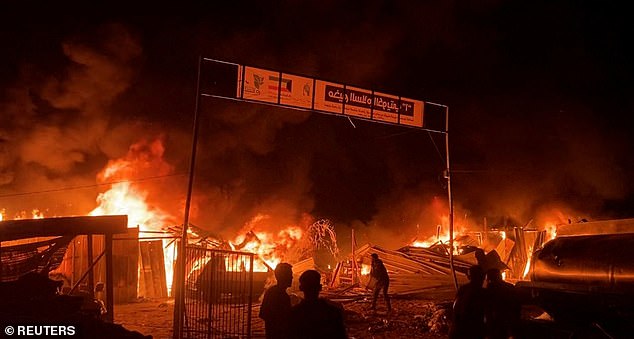The bombs used in the Israeli attack on a displaced persons camp in Rafah that killed dozens of Palestinians have been identified as made in the United States, according to weapons experts and visual evidence reviewed by The New York Times.
Debris from the attack included remains of a GBU-39 bomb, designed and manufactured in the US.
U.S. officials have advocated for Israel to use the bomb, saying it minimizes civilian casualties.
Trevor Ball, a former U.S. Army explosive ordnance disposal technician, identified the bomb by its tail and unique bolt pattern.
“I instantly knew the housing was a GBU,” Ball said. CBS News. “I’ve seen a lot of them in this conflict, and I’ve even gone back and analyzed past conflicts just to get an idea of what ordinances Israel has used in the past when I started researching this, and it’s a very different object, the GBU. “It’s a very unique round.”
Fire burns after an Israeli attack on an area designated for displaced Palestinians, amid the ongoing conflict between Israel and Hamas, in Rafah, in the southern Gaza Strip, since Monday.
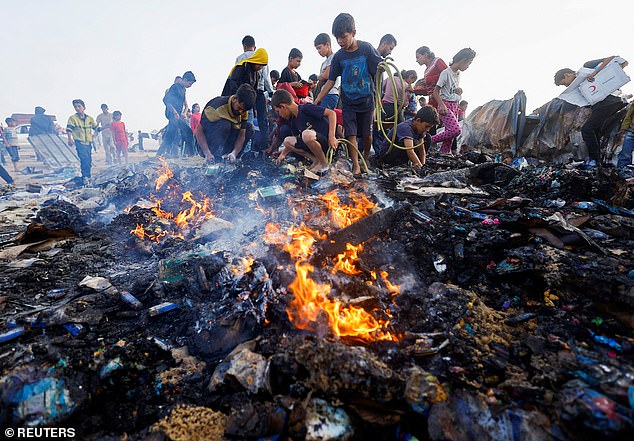
Palestinians search for food among burned rubble after an Israeli attack on an area designated for displaced people, in Rafah, in the southern Gaza Strip.
The fragments, filmed by Palestinian journalist Alam Sadeq, also bore numbers beginning with ‘81873,’ identifying the parts as manufactured by Woodward, a Colorado-based aerospace company.
At least 45 people in the Kuwaiti Al-Salam 1 camp, built in January, were killed by the bomb explosion and resulting fires, according to Gaza’s Health Ministry. Another 240 people were injured.
The United States had been pushing for Israeli military leaders to use GBU-39 bombs more frequently because they are more accurate and better suited to urban environments than larger bombs.
Earlier this month, President Biden said the United States was pausing delivery of the larger 2,000-pound bombs that Israel frequently uses.
“The attack was carried out using two munitions with small warheads suitable for this targeted attack,” said Rear Admiral Daniel Hagari, an Israeli military spokesman.
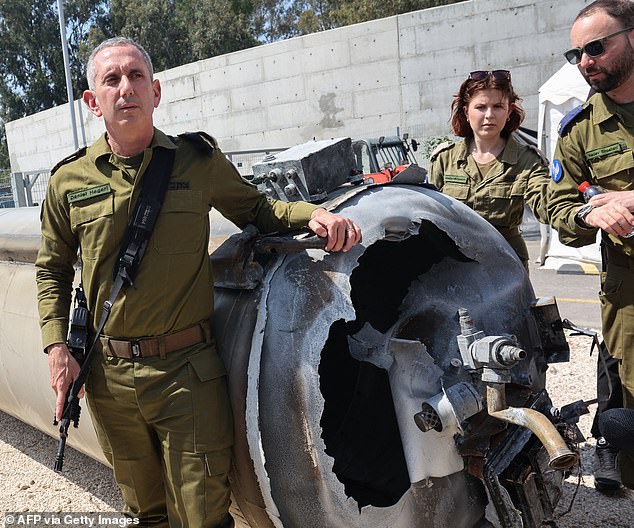
Rear Admiral Daniel Hagari explained how the military had taken specific measures to target two Hamas leaders who were killed in the attack and did not expect the bombs to harm nearby civilians.
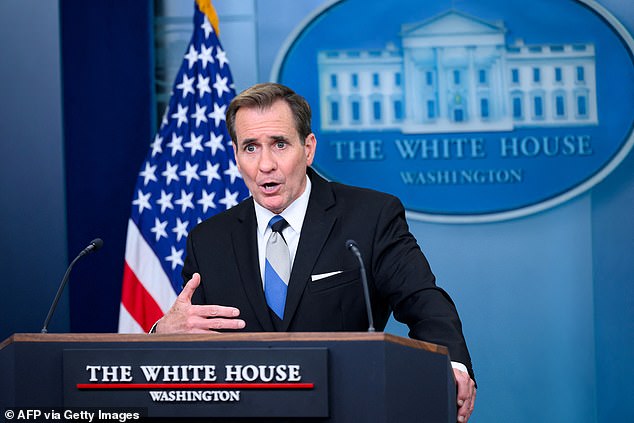
National security communications adviser John Kirby said there are still “no major ground operations” following repeated US contacts with Israel urging it to protect civilian life.
The bombs contained 17 kilograms of explosive material, he said. “This is the smallest munition our aircraft can use.”
Hagari explained how the army had taken specific measures to target two Hamas leaders who were killed in the attack.
They did not expect the bombs to harm any nearby civilians.
But the bombs fell inside a camp for people who had been displaced from other parts of Gaza earlier in the war. Tents were seen nearby, and footage appeared to show the bombing sparked fires.
“Our ammunition alone could not have started a fire of this size,” Admiral Hagari insisted.
“The Israelis have said they used 37-pound bombs,” White House spokesman John F. Kirby said at a briefing. “If that is indeed what they used, it is certainly indicative of an effort to be discreet, specific and precise.”
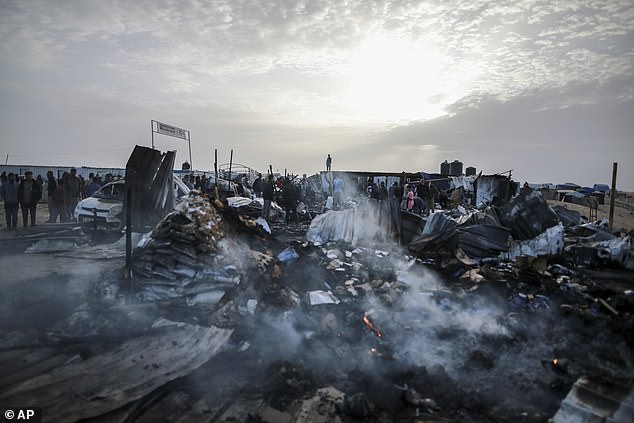
Palestinians observe the destruction following an Israeli attack where displaced people were staying in Rafah, in the Gaza Strip.
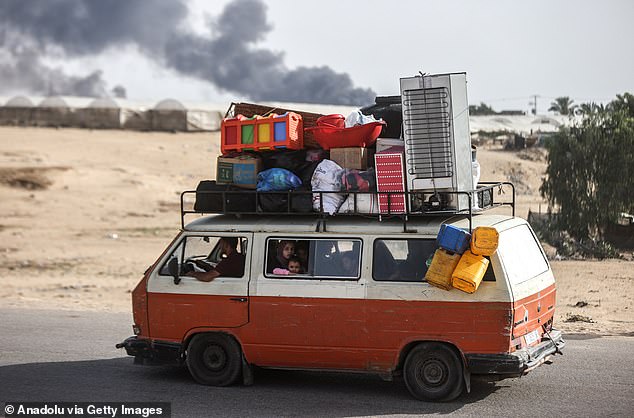
Palestinians, carrying their personal belongings, migrate to areas they consider safe after the Israeli army attacked tents in Al-Mawasi, previously declared a “safe zone” by Israel, in the southern city of Rafah. Loop.
Israel’s military on Wednesday took control of a strategic corridor along Gaza’s border with Egypt to cut off smuggling tunnels as it tries to destroy the Hamas militant group in a war that has now raged for eight months.
The capture of the Philadelphia Corridor could complicate Israel’s relationship with Egypt who has complained about Israel’s advance towards its border.
Israel says the corridor is flooded with tunnels that have funneled weapons and other goods to Hamas, despite a years-long blockade imposed by Israel and Egypt.
Israel also deepened its incursion into Rafah, where hundreds of thousands of people have been seeking refuge from the fighting. The army said a fifth brigade, made up of several thousand soldiers, joined troops operating in the city on Tuesday.
Egypt says any troop increase in the strategic border area would violate the 1979 peace agreement between the two countries. He has already complained that Israel has seized the Rafah border crossing, the only crossing between Gaza and Egypt.
An Israeli military official said Israel had notified Egypt of the takeover. Some 20 tunnels were found, including some previously unknown to Israel, as well as 82 access points to the tunnels, the official said, speaking on condition of anonymity in line with military regulations. It was unclear whether the tunnels were currently in use.
The fighting in Rafah has displaced one million people, according to the United Nations, most of whom were already displaced from other parts of Gaza.
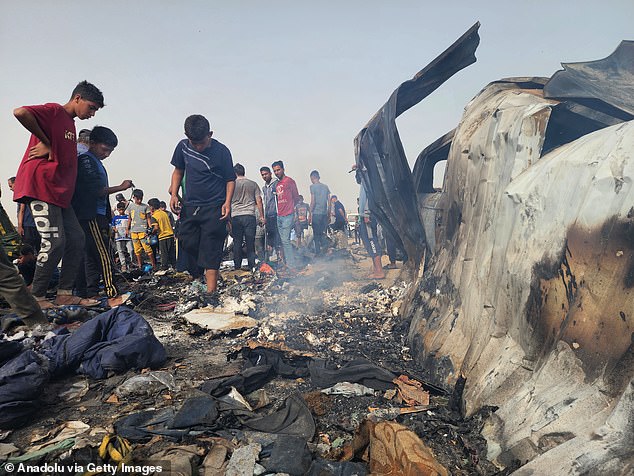
Palestinians see destruction after Israel bombs their shops and shelters in Rafah, Gaza
The United States and other allies have warned against a full-fledged offensive in Rafah, and the Biden administration said this would cross a “red line” and refused to provide offensive weapons for such an undertaking. But so far he has made no attempt to stop Israel’s advances.
Last week, the International Court of Justice ordered Israel to halt its Rafah offensive as part of South Africa’s case accusing Israel of committing genocide against Palestinians in Gaza, a charge Israel denies.
The war began when militants swept into southern Israel on October 7, killing about 1,200 people, most of them civilians, and taking about 250 hostages.
More than 100 were freed during a ceasefire in November in exchange for Palestinians imprisoned by Israel.
Israel’s offensive in response to the attack has killed at least 36,000 Palestinians, according to Gaza’s Health Ministry, which does not distinguish between combatants and civilians. Israel says it has killed 15,000 militants.


